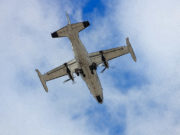Global flight safety standards for contracted aircraft operators have been updated to include air drop threats, controls and defenses in a collaboration involving Flight Safety Foundation, air operators and humanitarian organizations, and facilitated by the U.N. World Food Programme (WFP). Air drops are occasionally used by humanitarian organizations like WFP to deliver food and other basic supplies in remote areas.
Version seven of the new Basic Aviation Risk Standard (BARS) Program also includes the addition of safety goals at the top of each control and defense, providing industry with the ability to establish measures to rate the organization’s safety performance against each goal.
The BARS Program was created by Flight Safety Foundation (FSF) in collaboration with some of the world’s largest resource and mining companies to provide a more efficient means of monitoring, assessing and analyzing risks associated with contracted aviation operators.
FSF BARS Program Managing Director David Anderson said the inclusion of air drop risks and controls in the latest version of the program responded to the continued rise in global humanitarian activity and the unique challenges involved in these operations.
“Air drop activity has its own unique set of risks and controls and is very different to other aviation operations, which is why we’ve dedicated an entire appendix in this latest version of the BARS Program to these activities,” he said.
“The air drop section was developed in collaboration with humanitarian organizations and relevant operators and facilitated by the World Food Programme. The result is a common safety standard for aircraft operators to address the challenges of these complex operations.”
Anderson said the other significant update in the latest version of the BARS Program was the inclusion of safety goals — a result of industry feedback from resources, mining, construction and insurance organizations that contract aircraft and helicopter operators.
“No other standard has ever outlined ‘why’ a control is in place — the addition of safety goals to each control and defense in the standard is a significant step forward for our industry,” he said. “This provides aircraft operators with the guidance to establish metrics to assess how the organization is meeting its safety goals, improving visibility and performance.”
The latest edition of the BARS Program, version seven, is available for download from flightsafety.org/bars.
Anderson said that before the BARS Program was created, there were no clear benchmarks for companies to assess the safety of their own, or outsourced, air operations. This created multiple audit levels that were carried out with no information sharing or comparability between companies.
“Over the past seven years, the BARS Program has done more than 550 audits in 33 different countries for about 170 different aircraft operators,” Anderson said.
“We’re committed to collaborating with industry to ensure the BARS Program continues to help deliver increased safety for the contracted aviation sector globally.”
Flight Safety Foundation’s BARS Program won the prestigious Business Services category of the 2017 Australian Export Awards for “continually improving aviation safety methods” for aircraft contractors.
For more information on the BARS Program, please visit flightsafety.org/bars or contact the Foundation’s Australian regional office on +61 7 3221 0222.
About Flight Safety Foundation
Flight Safety Foundation is an independent, nonprofit, international organization engaged in research, education, advocacy and publishing to improve aviation safety. The Foundation’s mission is to connect, influence and lead global aviation safety.
BARS Contact
David Anderson
anderson@flightsafety.org
+61 7 3221 0222
